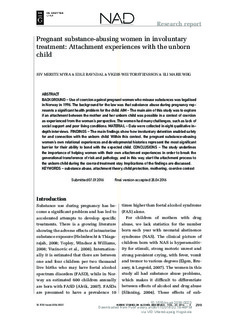Pregnant substance-abusing women in involuntary treatment: attachment experiences with the unborn child
Journal article, Peer reviewed
Permanent lenke
http://hdl.handle.net/11250/2399747Utgivelsesdato
2016Metadata
Vis full innførselSamlinger
- Artikler / Articles [1186]
Originalversjon
10.1515/nsad-2016-0023Sammendrag
Use of coercion against pregnant women who misuse substances was legalised
in Norway in 1996. The background for the law was that substance abuse during pregnancy represents
a significant health problem for the child. AIM – The main aim of this study was to explore
if an attachment between the mother and her unborn child was possible in a context of coercion
as experienced from the woman’s perspective. The women had many challenges, such as lack of
social support and poor living conditions. MATERIAL – Data were collected in eight qualitative indepth
interviews. FINDINGS – The main findings show how involuntary detention enabled safety
for and connection with the unborn child. Within this context, the pregnant substance-abusing
women’s own relational experiences and developmental histories represent the most significant
barrier for their ability to bond with the expected child. CONCLUSIONS – The study underlines
the importance of helping women with their own attachment experiences in order to break the
generational transference of risk and pathology, and in this way, start the attachment process to
the unborn child during the coerced treatment stay. Implications of the findings are discussed
